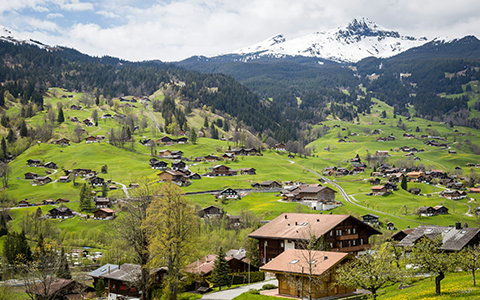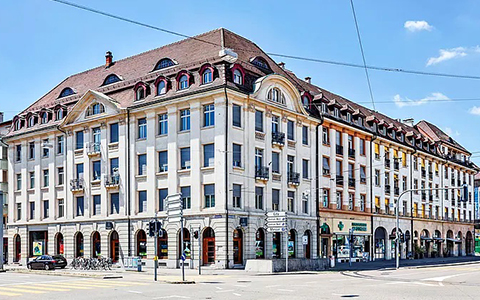-
 2024瑞士房地产市场展望
2024瑞士房地产市场展望
2024瑞士房地产市场展望 2024年,在价格稳定、利率变化以及不断变化的购房者偏好等因素的影响之下,瑞士房地产市场正经历着重大调整,为购房者、投资者和开发商同时带来了机遇和挑战。 市场现状 价格修正与稳定 瑞士房地产市场在经历了多年的快速增长后,正在经历一个冷却期。根据瑞银房地产泡沫指数(UBS Real Estate Bubble Index),苏黎世和日内瓦等城市的房价已不再面临严重泡沫破裂的风险。之所以出现这种缓和,是因为政府收紧了贷款规则,并采取相应措施,为过热的市场降温。 利率与可负担性 在过去几年中,利率不断上升,使得抵押贷款成本更高,并冷却了投机性购房。不过,有迹象表明,利率在未来可能趋于稳定甚至下降,从而为购房者创造新的机会。这种潜在的利率宽松引发了人们对购房的新兴趣,因为一些细分市场的房屋价格变得更容易负担。 需求变化和地区趋势 城市与郊区的偏好 在城市中心,由于高房价和利率上升,需求略有减弱。然而,在人们寻求更大空间和利用远程工作选择的推动下,郊区和农村地区对经济适用房的需求有所增加。因此,小城镇的开发量正在上升,尤其是基础设施项目。 租赁市场的弹性 尽管住房市场有所降温,但租赁需求依然强劲。利率的上升使一些潜在购房者望而却步,转而租赁房屋。投资者正在利用这一趋势,增加租赁市场的活动。 未来展望 利率或有下降 许多分析师预计,利率将在不久的将来趋于稳定或下降,从而使购房者更容易获得融资。这一转变将为市场注入新的活力,吸引更多的首次购房者和投资者。 房地产的可持续性 可持续性是瑞士房地产日益关注的焦点,新开发的楼盘都采用了节能设计和绿色技术。政府的激励措施和消费者的偏好正在推动开发商采用可持续发展的住房解决方案,这很可能成为未来几年市场的主要驱动力。 结语: 总体而言,瑞士房地产市场在经历了快速增长期后正在趋于稳定。虽然较高的利率抑制了需求,但潜在的利率下降可能会重振市场。向经济适用房和可持续发展项目的转变将决定未来的发展趋势,确保市场对国内外投资者保持吸引力。 Original English Text The Swiss real estate market in 2024 is undergoing significant adjustments, shaped by price stabilization, interest rate changes, and evolving buyer preferences. Key trends point to both opportunities and challenges for buyers, investors, and developers alike. Current Market Overview Price Corrections and Stabilization The Swiss real estate market is experiencing a cooling period after years of rapid growth. According to the UBS Real Estate Bubble Index, the market is no longer at risk of a severe bubble burst, with prices in cities like Zurich and Geneva. This moderation comes as a result of tighter lending rules and government measures aimed at cooling an overheated market. Interest Rates and Affordability Interest rates have risen over the past few years, making mortgages more expensive and cooling speculative buying. However, there are signs that rates could stabilize or even decline in the future, creating new opportunities for buyers. This potential rate relief has sparked renewed interest in homeownership, as prices in some segments of the market have become more affordable. Shifting Demand and Regional Trends Urban vs. Suburban Preferences In urban centers, demand has slightly weakened due to high prices and rising interest rates. However, the demand for affordable homes in suburban and rural areas has increased, driven by people seeking more space and taking advantage of remote work options. As a result, smaller towns are seeing a rise in development, especially in infrastructure projects. Rental Market Resilience Despite the cooling of the housing market, rental demand remains strong. The rising interest rates have deterred some potential buyers, pushing them towards rental properties instead. Investors are taking advantage of this trend, with increased activity in the rental market. Future Outlook Potential Decline in Interest Rates Many analysts expect interest rates to stabilize or decline in the near future, making financing more accessible for homebuyers. This shift could re-energize the market, attracting more first-time buyers and investors. Sustainability in Real Estate Sustainability is a growing focus in Swiss real estate, with new developments incorporating energy-efficient designs and green technologies. Government incentives and consumer preferences are pushing developers toward sustainable housing solutions, which are likely to become a key market driver in the years ahead. Conclusion In summary, the Swiss real estate market is stabilizing after a period of rapid growth. While higher interest rates have tempered demand, a potential decrease in rates could reinvigorate the market. The shift toward affordable housing and sustainable developments will shape future trends, ensuring that the market remains attractive for both domestic and international investors. 本文转载自瑞士雷梭勒家族办公室,如有侵权,敬请告知删除。 Sooswiss为您提供 瑞士方向私人管家式的定制服务: 1)家族传承 2)财富管理 3)投资咨询 4)企业服务 5)居留计划 6)国际教育 更多资讯请登录网站 www.sooswiss.com
-
 瑞士金融与地产集团(SFP)投资项目简介
瑞士金融与地产集团(SFP)投资项目简介
瑞士金融与地产集团(SFP)投资项目简介 瑞士金融与地产集团(SFP)简介 SFP总部位于瑞士苏黎世,是一家领先的房地产和基础设施投资公司。SFP管理资产超过96亿瑞郎,擅长直接和间接房地产投资、基础设施解决方案和资本市场交易。其专业领域包括管理大型房地产项目以及提供量身定制的投资解决方案。SFP拥有广泛的网络和强大的市场影响力,已成为瑞士和欧洲房地产市场的重要参与者。 基金概览 1. SF零售地产基金(瑞士) 物业类型:瑞士具有优质租户组合(如Lidl、Denner、Migros)的创收零售物业,约70处房产。 策略:投资位于黄金地段,以必需品零售为主,有长期租约的物业。 启动时间:2015年 上市:2017年在瑞士证券交易所上市,股票代码为SFR SW 总收益率:5.48%(2023年) 管理资产(AUM):9.04亿瑞郎 最低投资额:1股(110瑞郎)[2] 投资窗口:11月/12月 年管理费:0.48%–0.70% [1] 2. Next Gen Stays基金(西班牙和葡萄牙酒店组合) 物业类型:在西班牙和葡萄牙重新开发酒店资产,满足年轻旅行者的需求。 策略:再开发增值类项目,灵活的管理协议,计划项目稳定后退出。 启动时间:2024年 上市:否 回报:净内部收益率15%以上,年现金收益率5%-7% 投资期限:5年,可延长2年 目标投资总额:2.5亿欧元,已筹集股本:6000万欧元 最低投资额:50万欧元 [2] 投资窗口:9月/10月,筹集6500万欧元 费用:年管理费:总资产值的1%,年行政费:总资产值的0.15%-2%,绩效:利润的10%-15% [1] 3. VIGA RE A/S基金(哥本哈根住宅基金) 物业类型:丹麦哥本哈根的住宅物业,距离市中心20分钟车程。 策略:优+级优质资产投资,瞄准稳定的住宅需求,优化租金。 启动时间:2021年 上市:否 回报:净内部收益率10%-13%,无杠杆收益率4% 最低投资额:25万欧元 [2] 投资窗口:10月/11月 费用:年管理费:总资产价值的0.5%,年行政费:总资产价值的0.15%,绩效:15%,门槛为5% [1] 4. SFP英国定制租赁物业(BTR)基金 物业类型:英国高需求城市的私人租赁行业(PRS)物业,重点关注中端市场租赁物业。单一资产,共360套公寓。 策略:增值收购和开发,配备专业管理,目标客户为年轻的专业人士。 启动时间:2022年 上市:否 年回报率:投资资本的8.5% 增资:2025年春季 费用:年管理费:0.6%,年行政费:0.2%,绩效:全部利润的9% [1] 其他投资机会概述 A. 上市公司投资 概述:上市公司持有价值约7.5亿瑞郎的优质瑞士房地产资产组合,主要位于巴塞尔和苏黎世。该公司专注于黄金地段物业,提供稳定性和长期价值。 市值:5.44423亿瑞郎 投资机会:最低500万瑞郎,持有更多股份可获对上市公司的多数控制权[2] 回报:免税股息收益率为3.5%-4%,每年支付 B. 量身定制的投资项目 概述:为大额资本(例如2.5亿瑞郎以上)提供定制投资方案,使投资者能够建立定制的房地产投资组合。 定制:选择资产类型、地点、风险和目标收益率(例如3%-6%)。 投资组合管理:SFP负责寻找、收购和开发投资组合,投资者可在公司执行策略时参与重大决策。 如您希望了解有关SPF投资项目的更多详情,欢迎联系雷梭勒客户经理: ☎️ 400-006-7726
📧 asianoffice@lasoleille.com [1] 可根据要求提供详细的费用结构。 [2] 通过雷梭勒完成的对任何SFP投资产品的最低投资额为500万瑞士法郎。 Original English Text Swiss Finance & Property Group (SFP) Investment Profile Overview of Swiss Finance & Property Group (SFP) Based in Zurich, Switzerland, SFP is a leading real estate and infrastructure investment firm. With over CHF 9.6 billion in assets under management, SFP excels in direct and indirect real estate investments, infrastructure solutions, and capital market transactions. Their expertise includes managing large-scale real estate projects and providing tailored investment solutions. SFPs extensive network and strong market presence make them a prominent player in both Swiss and European real estate markets. Overview of Funds: 1. SF Retail Properties Fund (Switzerland) Focus: Income-generating retail spaces in Switzerland with strong tenant profiles (e.g., Lidl, Denner, Migros). Approximately 70 properties Strategy:Investments in essential goods-focused retail properties in prime locations with long term leases Launch: 2015 Listed: SIX Swiss Exchange (2017) under the ticker SFR SW Gross yield: 5.48% (2023) Assets Under Management (AUM): CHF 904 million Minimum Investment: 1 share (CHF 110) Capital Increases: November/December Management Fee: 0.48% – 0.70% [1] 2. Next Gen Stays Fund (Spanish & Portuguese Hotel Portfolio) Focus: Redevelopment of hotel assets in Spain and Portugal catering to younger travellers. Strategy: Value-add redevelopment projects with flexible management agreements and planned exits post-stabilization Launch: 2024 Listed: No Returns: Net IRR of 15%+, annual cash yields of 5%-7% Investment Term: 5 years with two potential 1-year extensions Total Target Investment Volume: EUR 250 million, Equity Raised to Date: EUR 60 million Minimum Investment: EUR 500,000 [2] Investment Window: September / October raising EUR 65 million Fees: Management: 1% on GAV, Admin: 0.15-2% on GAV p.a, Performance: 10-15% on profit [1] 3. VIGA RE A/S Fund (Copenhagen Residential Fund) Focus: Residential properties in Copenhagen, Denmark, within a 20-minute commute to the city centre Strategy: Core/core+ investments targeting stable residential demand and rental optimization Launch: 2021 Listed: No Returns: Net IRR of 10%-13%, unlevered yield of 4% Minimum Investment: EUR 250,000 [2] Investment Window: October/November Fees: Management: 0.5% on GAV, Admin: 0.15% on GAV p.a, Performance: 15% with 5% hurdle [1] 4. SFP UK Build-to-Rent (BTR) Fund Focus: Private Rental Sector (PRS) properties in high-demand UK cities, focusing on mid-market rental properties. Single asset deal 360 apartments Strategy: Value-add acquisitions and developments with professional management, targeting young professionals Launch: 2022 Listed: No Yearly Return: 8.5% of the invested capital Capital Increases:Spring 2025 Fees: Management: 0.6% on GAV, Admin: 0.2% on GAV p.a, Performance: 9% of all profit [1] Overview of Other Investment Opportunities: A. Investment in the Publicly Listed Company Overview: The publicly listed company holds a robust portfolio of premium Swiss real estate assets, mainly in Basel and Zurich, valued at approximately CHF 750 million. The company specializes in prime locations, offering stability and long-term value Market Cap: CHF 544.423M Investment Opportunities: CHF 5 million minimum, with larger stakes potentially securing majority control of the listed company [2] Returns: Tax-free dividends yield of 3.5% - 4% paid yearly B. Tailor-Made Mandates Overview: Customized investment solutions for larger capital (e.g., CHF 250 million+), allowing investors to build a bespoke real estate portfolio Customization: Choose asset types, locations, risk, and target yields (e.g., 3%-6%) Portfolio Management: SFP handles property search, acquisition, and portfolio development, with investors able to be involved in major decisions while the firm executes the strategy [1] Detailed fee structure available upon request. [2] Through La Soleille, the minimum investment amount for any SFP investment offering will be CHF 5 million. 本文转载自瑞士雷梭勒家族办公室,如有侵权,敬请告知删除。 Sooswiss为您提供 瑞士方向私人管家式的定制服务: 1)家族传承 2)财富管理 3)投资咨询 4)企业服务 5)居留计划 6)国际教育 更多资讯请登录网站 www.sooswiss.com
-
 隆奥银行观点丨利率降低为瑞士房地产带来机遇
隆奥银行观点丨利率降低为瑞士房地产带来机遇
隆奥银行观点 | 利率降低为瑞士房地产带来机遇 导读: 随着利率下降和一些地区的估值达到一个有吸引力的点,当前可在上市房地产领域寻找投资机会;因为瑞士房地产具有吸引力的收益率和支持性的基本面,包括强劲的需求、低空置率和不断上涨的公寓租金,隆奥银行最近增加了瑞郎计价投资组合的瑞士房地产敞口;瑞士主权债券收益率不断下降,应会推高房地产估值,从而增加对房地产基金的需求;在瑞士上市的基金也可能因投资者重新配置而在年底获得收益。本文内容由雷梭勒家族办公室根据隆奥银行(Lombard Odier)资深股票策略师Edmund Ng和客户投资组合专家Fabio Simoncini在2024年8月20日发表的文章编译整理,版权归原作者所有。 上市房地产投资的前景正在发生变化。隆奥银行研究了全球前景,并为瑞士投资者探索了特殊的机会。 随着市场动态和全球利率周期的变化,房地产的相对吸引力也在变化。在过去18个月的大部分时间里,隆奥银行对这一资产类别持负面看法,这体现在股票敞口中对上市房地产投资信托基金(REITs)的减持。从宏观经济角度来看,隆奥银行预期利率环境将在更长时间内走高,因此也避开了对利率高度敏感的股票。与主权债券的无风险高利率和收入相比,房地产投资信托基金的收益率缺乏吸引力,其估值看起来很脆弱。该行业处于持续下行趋势,在投资者增加“另类”资产配置十多年后,隆奥银行预计资金外流将持续下去。 也许令人惊讶的是,在负面新闻的背景下,除了一些写字楼供应过剩,以及一些不值得为满足更严格的环保标准而改造的项目以外,房地产资产的经营基本面似乎不那么令人担忧。投机性建筑活动的缺乏,意味着大多数房地产细分市场(包括住宅、工业仓库和酒店)的空置率仍然很低,租金依旧在继续增长。 选择性机会出现 考虑到这一点,隆奥银行在7月份将对房地产投资信托基金的立场从负面调整为中性。那么,究竟改变了什么?首先,全球利率周期正在转变,这是通胀正常化和增长放缓的结果,而不是令人担忧的经济低迷。虽然隆奥银行认为最近对美国经济衰退的担忧被夸大了,但预计美联储将加入其他主要央行的行列,从9月份开始降息,因为通胀回到目标水平,劳动力市场疲软。发达市场利率的下降应该会为房地产投资提供有利条件,投资者有时会像看待债券一样看待房地产投资。利率下降还应缓解人们对商业房地产债务再融资和银行对该行业敞口的一些担忧。 商业地产估值目前已降至一个点,一些长期投资者已开始购买有吸引力的资产。今年4月,黑石集团收购了一家价值100亿美元的房地产投资信托基金,专门从事多户住宅。8月份,上市房地产投资信托基金(REIT)收购了7年来最大的一笔美国公寓投资组合,价值超过10亿美元。英国房地产投资信托行业今年出现了一波收购和合并浪潮。根据我们的经验,这样的时刻往往伴随着周期的触底和前景的改善。隆奥银行还看到,投资者从房地产基金外流和赎回的速度有所放缓,这表明一个更健康的背景正在形成。综上所述,隆奥银行认为投资情况有所改善,眼光长远的投资者现在应该寻找有选择性的机会。 瑞士房地产的案例 瑞士房地产市场受益于一些有利因素。在创纪录的移民数量下,市场对住宅公寓的需求强劲。与此同时,新建筑的建设受到限制。考虑到国家的规模,可用土地供应短缺,而该国的《空间规划法》(Spatial Planning Act)倾向于在大都市地区建设,以保护未开发的土地,而且建设许可需要时间,各州的程序各不相同。瑞士联邦统计局(Swiss Federal Statistics Office)的数据显示,瑞士公寓空置率继续下降,到2023年,全国公寓空置率将达到1.15%的新低。隆奥银行还认为,在通胀仍为正、参考利率为1.75%的情况下,今年至少有四分之一的住宅公寓可能会提高租金。这个基于抵押贷款信贷的市场利率用于计算租金,并没有随着瑞士国家银行(SNB)政策利率的下降而下降。 与此同时,瑞士上市房地产基金目前约2.6%的收益率为主权债券提供了提振,而截至7月底,10年期联邦债券的收益率仅为0.45%(见图1)。鉴于隆奥银行预计瑞士央行将在9月份进一步降息25个基点,这一利差应该会进一步扩大。主权债券收益率不断下降,应会对实物房地产资产的估值产生积极影响,并最终对持有这些资产的基金产生积极影响。在这里,延迟可以从6-12个月不等,这取决于基金净资产价值的计算频率。 图1:瑞士房地产基金的分配收益率与10年期瑞士国债收益率 数据来源:彭博社,隆奥银行 瑞士房地产基金内部的动态看起来也很有利。这些基金的资本增加在一年中往往有两个高峰:春季和秋季。平均而言,在过去10年里,这导致基金价值在8月至10月间下降了约2.15%。今年以来,从7月底上市基金指数的业绩峰值来看,跌幅约为2.7%。这让隆奥银行相信,此类基金的传统秋季估值可能已经触底。展望未来,瑞士房地产基金的年终表现通常是积极的。因此,投资者的年终税收规划可能会导致对财务收益更高的房地产基金的需求增加。 Original English Text Swiss real estate offers opportunities as interest rates decline Key takeaways As interest rates fall and valuations in some areas reach an attractive point, we now seek select opportunities in the listed real estate space We have recently added listed Swiss real estate exposure to Swiss franc-denominated portfolios for its attractive yield and supportive fundamentals, including strong demand, low vacancy rates, and rising apartment rents Falling Swiss sovereign yields should boost real estate valuations, which should increase demand for real estate funds Listed Swiss funds may also see end-year gains from investor repositioning. The outlook for listed real estate investments is shifting. We examine the global outlook and explore particular opportunities for Swiss-based investors. As market dynamics and global interest rate cycles change, so do the relative attractions of real estate. Over much of the last 18 months, we have had a negative view on the asset class, expressed via an underweight allocation to listed real estate investment trusts (REITs) within our equity exposures. From a macroeconomic perspective, our expectation of a higher-for-longer interest rate environment means we have avoided stocks with a high sensitivity to rates. REIT valuations looked vulnerable, given unattractive yields in comparison to the high risk-free rates and income available on sovereign bonds. The sector traded in a persistent downtrend, and we expected outflows to persist after more than a decade of investors increasing allocations to ‘alternative’ assets. Perhaps surprisingly given negative headlines, the operating fundamentals of real estate assets appeared less of a concern, with the exception of some overcapacity in offices, and some that were not worth retrofitting to meet tighter environmental standards. The lack of speculative construction activity meant that vacancy rates remained rather low in most real estate sub-segments – including residential housing, industrial warehouses and, to some extent, hotels – and rental growth continued. Selective opportunities emerging Taking this into account, in July we shifted our stance on REITs from negative to neutral. What changed? First, the global rate cycle is turning, as a result of normalising inflation and slackening growth rather than a worrying downturn. Whilst we believe that recent US recession fears are overblown, we expect the Federal Reserve (Fed) to join other major central banks in cutting interest rates from September, as inflation reverts to target and labour markets weaken. Declining rates in developed markets should provide a tailwind for real estate investments, which investors sometimes view in a similar way to bonds. Falling rates should also alleviate some concerns on commercial real estate debt refinancing and banks’ exposures to the sector. Commercial real estate valuations have now fallen to a point where some long-term investors have started buying attractive assets. Blackstone acquired an REIT worth USD 10 billion specialised in multi-family residential housing in April. August saw the largest purchase of a US apartment portfolio by a listed REIT in seven years, valued at over USD 1 billion. The UK REIT sector has seen a wave of takeovers and mergers this year. In our experience, such moments often coincide with the bottoming of the cycle, and an improving outlook. We have also seen a slowdown in investor outflows and redemptions from real estate funds, suggesting a healthier backdrop is emerging. Taken together, we believe the investment case has improved and investors with a long-term horizon should now be on the lookout for selective opportunities. The case for Swiss real estate The Swiss real estate market benefits from some favourable dynamics. Demand for residential apartments is strong, amid record immigration levels. Meanwhile, the construction of new buildings is limited. Available land is in short supply given the size of the country, while the nation’s Spatial Planning Act favours building in metropolitan areas to protect undeveloped land and construction permits take time, with procedures varying between cantons. Swiss apartment vacancy rates continue to fall, reaching a new low of 1.15% countrywide in 2023, according to the Swiss Federal Statistical Office. We also see the potential for at least a quarter of residential apartments to increase rents this year, amid still-positive inflation, and a ‘reference rate’ of 1.75%. This market-based rate, based on mortgage credit, is used for calculating rents, and has not yet fallen with the decline in the Swiss National Bank’s (SNB) policy rates. At the same time, yields of around 2.6% on listed Swiss real estate funds currently offer an uplift on sovereigns, with 10-year Confederation bonds yielding just 0.45% as of end-July (see chart 1). This differential should receive a further boost given our expectation of the SNB cutting rates by a further 25 basis points in September. Falling sovereign yields should have a positive impact on the valuations of physical real estate assets and, in time, on the funds that own them. Here the delay can be from 6-12 months depending on how often the funds’ net asset value is calculated. Chart 1: Swiss real estate fund’s distribution yield vs 10-year-Swiss government bond yield Sources: Bloomberg, Lombard Odier Dynamics within Swiss real estate funds also look favourable. Capital increases by these funds tend to have two peaks during the year: in spring and in autumn. On average, over the last 10 years, this has led the value of funds to fall by around 2.15% between August and October. This year, from the performance peak in the listed fund index at the end of July, the decline has been about 2.7%. This leads us to believe that the traditional autumn valuation floor for such funds may already have been reached. Looking further ahead, the year-end period is typically positive for the performance of Swiss real estate funds. Here, year-end tax planning by investors can lead to increased de...
-
 瑞士房地产:绝佳的投资选择
瑞士房地产:绝佳的投资选择
瑞士房地产:绝佳的投资选择 导语: 瑞士,这个坐落在阿尔卑斯山脉中的国家,以其无与伦比的自然风光、安全安定的社会环境以及高品质的生活标准闻名世界。在投资领域,瑞士房地产被誉为“钻石级”资产,凭借其独特的优势和长远的回报潜力,吸引了全球投资者的关注。 为什么投资瑞士房地产? 因素一:稳定的经济环境 瑞士的经济环境是其房地产市场稳定增值的关键因素之一。长期低失业率和稳定的通货膨胀率为瑞士经济提供了坚实的基础。 根据瑞士联邦统计局的数据,从2007年到2024年,瑞士的通货膨胀率保持在平均0.47%左右,这一水平远低于欧盟及其他主要经济体。这种低通胀环境保证了货币的购买力,使得生活成本保持相对稳定,有助于保持消费者的购买力。 其次,瑞士的失业率相对较低且保持稳定。在1991年至2023年间,瑞士的平均失业率约为3.9%,显著低于其他欧美国家。这种低失业率反映出了瑞士劳动市场的健康状态,意味着大部分居民能够获得稳定收入并进行长期投资,进一步增强了房地产市场的吸引力。 据统计,2023年瑞士人均GDP达到了98,800美元,这一高水平的购买力显著推动了房地产市场的需求,使得房地产市场能够稳定发展,房地产价格和租金水平也因此保持了相对稳定的增长,为投资者们提供了稳定且可观的投资回报。 因素二:安全的投资环境 瑞士连续13年被誉为全球最具创新性国家,吸引了大量企业在此设立总部。同时,作为地处欧洲核心位置的国家,瑞士也吸引了众多精英家庭定居于此。这不仅是由于其相对较低的综合税率,更是因为瑞士拥有安全、透明且可靠的投资环境。 根据2022年世界廉政透明指数调查结果显示,瑞士在全球180个国家中排名第七。这一高水平的透明度有效降低了投资中的不确定性,从而使得房地产投资者能够在一个公正和清晰的市场中操作,减少了由于腐败和不透明引发的法律和财务风险。 此外,瑞士的法律和法规体系也为投资者提供了强有力的保障。外国企业和瑞士本国企业在瑞士享有平等待遇,能够自由设立、收购和处置商业企业,无特殊投资限制,也无禁投清单。特别是自2021年以来,瑞士政府完善了外国直接投资(FDI)筛选制度的总体框架,进一步优化了投资环境。2022年通过的法案更是重点关注了外国投资者并购案例,进一步降低了投资障碍,确保了市场的公平竞争。 根据安永统计数据显示,2023年瑞士的外商直接投资增幅达到53%,这一显著的增长直接表明了外国资本对瑞士市场的信心和兴趣持续增强,瑞士房地产市场的价值和潜力也将随之得到进一步提升。 因素三:坚挺的瑞士法郎 瑞士法郎在全球金融市场中一直被视为“避风港”货币。无论全球经济形势如何波动,瑞士法郎总能表现出其相对稳定性。这主要得益于瑞士严格的财政纪律(如债务制动规则)、稳定的出口顺差以及强健的金融产业。 2015年以前,为了促进出口,瑞士政府压低瑞士法郎价值,将其对欧元的汇率设为1欧元=1.2瑞郎。随着全球经济环境的变化和内部经济形势的演变,自2015年开始,瑞士政府解除了这一汇率限制,允许瑞士法郎升值。此后历年,瑞士法郎的价值稳步上涨。这种长期的增值趋势为投资者提供了稳定的货币环境,使其可以有效规避全球经济波动带来的风险,这也进一步增强了瑞士房地产投资的吸引力。 因素四:高品质的房地产 瑞士房地产以其卓越的建筑质量著称。瑞士的建筑标准和区域划分标准被认为是全球最严格的国家之一。政府和监管部门对建筑质量、房屋的可持续性以及环境保护和建筑遗产等方面有着严格的要求。开发商不仅需要遵循联邦政府的规则,还必须符合各州及社区级别的管理条例。 为了保证建筑物的高品质,瑞士房屋均采用高质量的建筑材料,并按照高标准进行施工,因而也导致了瑞士的房屋建筑成本在全欧洲属于最高水平。这种高成本虽然增加了初期投资,但从长远来看,能够有效降低折旧和翻新的成本,有利于资产的长期保值,为投资者带来稳定的回报。 因素五:资本增值潜力 瑞士房地产市场的资本增值潜力相当可观。由于瑞士土地资源的有限性,房地产市场长期处于供不应求的状态,导致了房价逐年稳定上涨。长期来看,瑞士房地产市场稳健的增值趋势为投资者提供了持续的回报机会。 对比瑞士的各主要区域,尽管从整体上来看,它们在房地产市场的长期涨幅和波动没有显著差异,但作为瑞士经济中心的苏黎世,其房地产市场的价格波动还是相对更大;而瑞士法语区的房地产市场价格波动则相对较小,体现出了更为稳定的资本增值潜力。这种稳定性可以使投资者在法语区获得相对较低的市场风险和可预测的长期回报。 从供求趋势方面来看,近年来,每年约有10万名移民定居瑞士,其中大多数为来自世界各地的精英人士。这些移民对高品质房地产的需求旺盛,推动了市场的持续增长。 此外,2022年的升息也对建筑行业造成了一定的打击,导致了新房供应减少。这种供应紧张的情况不仅推高了房价,也促使了租金上涨,进一步增强了房地产市场的资本增值潜力。 因素六:瑞士住宅房产赋税低廉 在瑞士拥有住宅房产所承担的税赋是相对较低的,主要包括两种税赋:租金所得税和资本利得税。租金所得税是指在扣除房贷利息和房产维护费后的租金净收入需要缴纳的税款。资本利得税则是指在出售房产时,针对房产增值部分征收的税款。瑞士的资本利得税税率具有递减特性,这就意味着持有房产的时间越长,税率将会越低 与许多其他国家相比,瑞士的房地产税赋结构较为简洁明了,避免了复杂的税务规定和高额的额外费用。这种税赋环境的综合优势,使得瑞士成为房地产投资者的理想选择,特别是对于那些寻求稳定回报和低税负的投资者而言,瑞士的税收政策提供了显著的吸引力。 (商业地产一般与住宅地产同样需缴纳交易税、资本利得税、财富税、房产税,收入所得税等。) 另外,瑞士房地产的交易程序也十分规范且透明。所有房地产交易必须经过书面销售协议的公证,并在土地登记处完成登记后,方可视为正式转让。这种清晰的流程确保了交易的合法性,进一步保障了投资者的权益。 因素七:瑞士红利 瑞士为房地产投资者提供申请贷款机会,最高贷款成数(LTV)可达90%。投资者仅需支付低额利息即可获得贷款,大大降低了进入房地产市场的门槛。 同时,购房者还可利用稳定的房产增值或租金收入来抵消贷款支出,进一步降低购房贷款的实际成本。 此外,低贷款利率和稳定的贷款条件也有助于购房者保持充足的现金流。获得稳定贷款后,购房者可以将剩余资金重新投入瑞士市场。这种再投资机会可以帮助投资者从不同资产类别中获得额外收益,如股市、企业投资或其他房地产项目,从而实现财富的多元化增长。 因素八:永久产权,代际相传 瑞士房产享有永久产权,这意味着投资者在购买房产后,即可拥有该物业的永久使用权。这种产权安排为投资者提供了长期稳定的投资保障,使得房产能够成为家庭财产的一部分,并且代代相传。 另一方面,瑞士在联邦层面没有遗产税和赠与税(配偶间的赠予免遗产税,但对后代的赠予在某些州可能需要缴纳遗产税),这一政策确保了财富的长期传承与积累,不仅有助于维护家族财富,也使得房地产投资成为一种理想的长期财富储备手段。 此外,瑞士稳定的社会经济环境,以及高增长、低通胀的经济运行态势也为房地产提供了良好的保值增值条件。对于投资者来说,瑞士房地产不仅是资产保值的首选,更是一份能够传承给后代的稳固财富。 雷梭勒房地产投资 雷梭勒家族办公室致力于为投资者提供稳健且有回报的房地产投资机会,特别是在瑞士这样一个稳定且富有潜力的市场。如果您倾向于风险可控、回报稳定、细水长流的房地产投资,我们将助力您投资瑞士房地产,并根据您的投资策略在瑞士为您寻找优质房地产投资标的。 【住宅用房】 对于希望在瑞士购置“梦中情房”的投资者,在您获得瑞士居住身份后,我们将根据您的需求,帮助您找到增值空间大且环境优美的理想居所。我们的专业团队拥有多年的市场经验,能够确保您的投资既满足生活需求,也能带来长期回报。 【旅游度假屋】 如果您希望投资于度假性质的房地产,我们可提供丰富的旅游度假屋选项。无论是阿尔卑斯山的豪华山景房,还是其他风景名胜地的度假屋,我们都能为您找到独特且完美的度假之所。我们的度假屋资源覆盖瑞士全境,让您能够在舒适的环境中享受全年的休闲娱乐时光,创造难忘、美好的回忆。 【星级酒店】 随着瑞士高端旅游市场的蓬勃发展,投资于星级酒店不仅可以吸引高净值客群,保持稳定且丰厚的收入,还能为您带来无上价值与世代相传的财富潜力。我们将通过瑞士的布局网络,帮助您找到理想的酒店投资标的。 【办公楼商业地产】 在商业地产方面,我们专注于为投资者提供租金收入稳定的写字楼投资机会。瑞士的商业地产市场提供了多样化的盈利模式。我们将凭借敏锐的市场洞察力和丰富的专业经验,为您挑选出具有稳定现金流和升值潜力的办公楼,确保您的投资在强劲的市场环境中获得理想的回报。 结语: 投资瑞士房地产,您不仅能享受稳健的回报,还能将财富代代相传,保值增值。对于追求长期稳定投资的投资者而言,瑞士房地产无疑是一个绝佳的选择。 在瑞士房地产领域,雷梭勒家族办公室拥有丰富的市场经验、广泛的资源网络、精准的投资分析以及个性化的客户服务。选择雷梭勒家族办公室,您将与业内专业团队合作,获得量身定制的投资方案,发现最具潜力的投资机会。 如您希望了解更多瑞士房地产投资的相关资讯,欢迎联系雷梭勒客户经理: ☎️ 400-006-7726
📧 asianoffice@lasoleille.com 本文转载自瑞士雷梭勒家族办公室,如有侵权,敬请告知删除。 Sooswiss为您提供 瑞士方向私人管家式的定制服务: 1)家族传承 2)财富管理 3)投资咨询 4)企业服务 5)居留计划 6)国际教育 更多资讯请登录网站 www.sooswiss.com

 2024瑞士房地产市场展望
2024瑞士房地产市场展望
 瑞士金融与地产集团(SFP)投资项目简介
瑞士金融与地产集团(SFP)投资项目简介
 隆奥银行观点丨利率降低为瑞士房地产带来机遇
隆奥银行观点丨利率降低为瑞士房地产带来机遇
 瑞士房地产:绝佳的投资选择
瑞士房地产:绝佳的投资选择